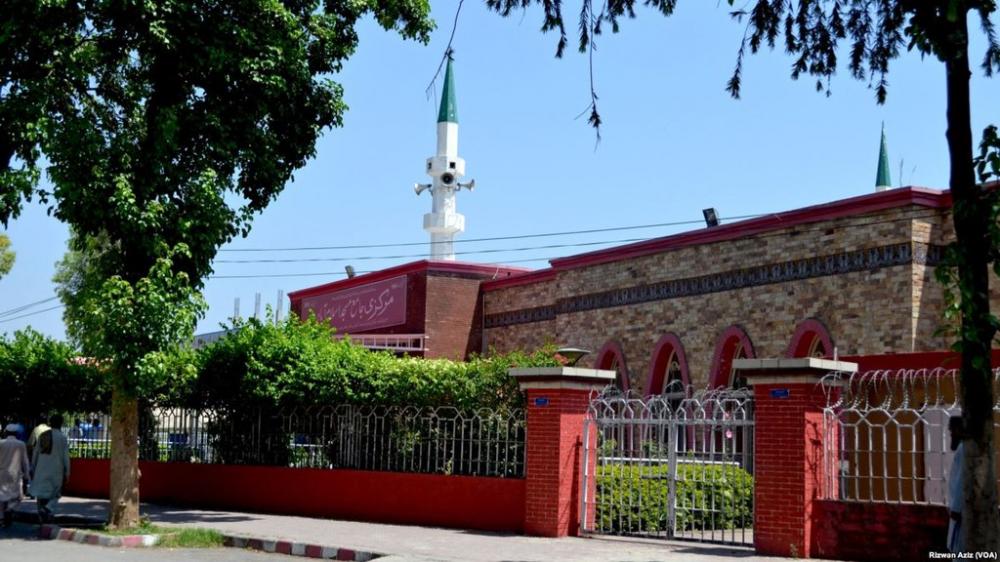Just Earth News | @justearthnews | 10 Jun 2020, 12:00 pm Print

Wikimedia Commons
Islamabad: Returning to spotlight, controversial Maulana Abdul Aziz, who had led the weekly congregational prayer without taking any anti-Covid-19 measures and had openly displayed weapons, reached an agreement with the Pakistani government by which he vacated Lal Masjid G-6 and moved to the madrassah Jamia Hafsa in G-7.
The controversial figure and his family vacated the Lal Majid, as per the agreement reached, media reports said.
Both the mosque and seminary in G-6 are government-owned property. According to the recent negotiations, Maulana Aziz and his family will also not be allowed to enter the mosque for two months, reports Voicepk.net.
Haroon Rasheed, son of Abdul Rashid Ghazi and son-in-law of Aziz, has taken over the administration of the masjid.
The deal was brokered last week with the help of Ahle Sunnat Wal Jamaat leader Maulana Ahmed Ludhianvi, who was previously banned under the Anti-Terrorism Act, the news portal reported.
Both Maulana Abdul Aziz and Islamabad DC Hamza Shafqat have refused to talk further about this agreement, but Haroon Rasheed, the son-in-law of Maulana Aziz told journalist Sabookh Syed that Muhammad Ahmed Ludhianvi acted on behalf of the government of Pakistan as a guarantor of the deal.
According to the agreement, Maulana Aziz will be free to travel all across Pakistan at his own will after two months, reported the news portal.
Earlier in February 2020, Maulana Aziz occupied the state-owned mosque Lal Masjid, claiming to be its rightful ‘khateeb’ (orator). The move was ignored by the authorities, until later when approximately a hundred female students of Jamia Hafsa from G-7, broke into another sealed building of a seminary at H-11, it said.
The maulana continued to deliver an aggressive Friday sermon against state authorities, saying that he would not abide by orders of a state that followed “international agenda”.
According to sources, the Interior Ministry said that it received orders from ‘higher-ups’ to resolve differences with Maulana Aziz through talks rather than by force, reported the news portal.
Maulana Aziz’s violation of lockdown orders was even raised in the NCOC (National Command and Operation Center) during which Interior Minister Ejaz Shah said that legal action will be taken against Maulana’s provocative sermons.
However, no action has been taken against him.
Instead, the government has adopted the way of appeasing him.
In the last 12 months, three cases have been filed against Maulana Aziz for flouting SOPS and violating lockdown orders under section 144 (placed to limit the spread of coronavirus), 270 (malignant act likely to spread infection of disease dangerous to life) and 188 (disobedience to public order duly promulgated by public servant), reported the news portal.
According to police officials, Aziz not only led the weekly congregational prayer without taking any precautionary measures but also openly displayed weapons, it said.
Questioning the role of PM Imran Khan-led government, the portal said: "Ironically, on 5th June, PM Imran Khan appeared on national television and claimed that the Tiger Force has done commendable work to ensure the implementation of SOPs in mosques and that none of the coronavirus cases were traced back to mosques."
Analysts question why the current and previous governments have refrained from taking any strict action against Maulana Aziz.
Sources told the news portal that despite the latest agreements, the conflict remains far from being resolved, and in fact, the recent deal could be interpreted as a shameful surrender, as the state officials seem to be on-board with the current government.
The Siege of Lal Masjid was a confrontation in July 2007 between Islamic fundamentalists and the Government of Pakistan, led by President Pervez Musharraf and Prime Minister Shaukat Aziz.
The focal points of the operation were the Lal Masjid and the Jamia Hafsa madrasah complex in Islamabad, Pakistan.
- After 27 years and 608 days in space, NASA Astronaut Suni Williams retires
- Embarrassment for Pakistan: Defence Minister Asif launches ‘Pizza Hut’ declared fraud by company
- One click, total collapse: Moody’s warns AI could break global cyber defences by 2026
- What happened at EDC Thailand? Tourist dies under mysterious circumstances
- From Motel to crime hub: Indian-origin couple among five arrested in US sex and drug trafficking case





-1763561110.jpg)
